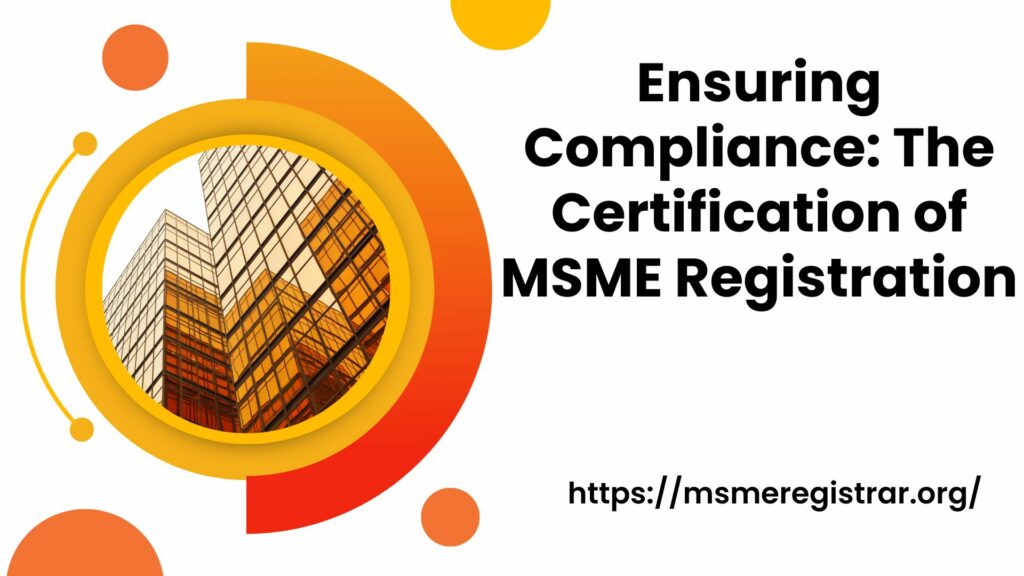Introduction:
In today’s global economy, Micro, Small, and Medium Enterprises (MSMEs) play a crucial role in driving economic growth, creating jobs, and fostering innovation. Recognizing their significance, governments around the world have implemented various policies and initiatives to support and empower these enterprises. One such measure is the certification of MSME registration compliance. This article delves into the importance of certification, its benefits, and the process involved in ensuring MSME registration compliance.
Understanding MSME Registration:
Micro, Small, and Medium Enterprises are defined based on criteria such as investment in plant and machinery, turnover, and employee strength. Registering as an MSME provides enterprises with numerous advantages, including access to financial assistance, government schemes, and protection under various laws. It serves as a recognition of their contribution to the economy and enhances their credibility in the market.
The Significance of Compliance:
While MSME registration offers several benefits, compliance with the regulations and requirements is equally important. Compliance ensures that enterprises adhere to the stipulated guidelines and standards, fostering transparency, accountability, and fair practices. Compliance also safeguards the interests of stakeholders, including employees, customers, and the government. It helps build trust and credibility, facilitating smoother business operations and promoting sustainable growth.
The Need for Certification:
Certification of MSME registration compliance provides an official acknowledgment that an enterprise has met all the necessary regulatory obligations. It serves as a testament to the enterprise’s commitment to upholding ethical business practices, financial transparency, and legal requirements. Certification instills confidence in stakeholders and differentiates compliant MSMEs from those that may not adhere to the prescribed norms. It also acts as a valuable marketing tool, highlighting the enterprise’s dedication to quality and reliability.
Benefits of Certification:
Enhanced Credibility and Trust:
Certification enhances an MSME’s reputation and credibility in the market. It assures stakeholders, including customers, suppliers, and investors, that the enterprise follows the prescribed guidelines, leading to increased trust and confidence in its products or services.
Access to Financial Assistance:
Many government schemes and financial institutions prioritize certified MSMEs while providing loans, grants, and other forms of financial assistance. Certification improves an enterprise’s eligibility for such support, facilitating growth opportunities and expansion plans.
Competitive Advantage:
Certification provides MSMEs with a competitive edge in the market. It demonstrates the enterprise’s commitment to quality, compliance, and ethical business practices, giving it an advantage over non-certified competitors.
Business Expansion and Collaboration:
Certified MSMEs are often preferred partners for collaborations, joint ventures, and supply chain arrangements. Certification opens doors to potential partnerships, expanding business opportunities and increasing market reach.
Process of Certification:
The certification process typically involves the following steps:
Documentation Review:
An authorized certification body reviews the MSME’s documentation, including registration details, financial statements, compliance records, and relevant licenses. They assess the enterprise’s adherence to legal and regulatory requirements.
On-site Audit:
Certification bodies conduct on-site audits to evaluate the MSME’s compliance with operational standards, safety protocols, and quality management systems. They verify the implementation of prescribed practices and assess the effectiveness of internal controls.
Corrective Actions:
If any non-compliance or deviations are identified, the certification body provides recommendations for corrective actions. The MSME must address these issues within a specified timeframe to ensure compliance.
Certification Approval:
Once the MSME successfully demonstrates compliance with all requirements, the certification body grants the certification of MSME registration compliance. The certificate is valid for a specified period, usually subject to surveillance audits to ensure continuous adherence to standards.
Conclusion:
Certification of MSME registration compliance holds significant importance in today’s business landscape. It establishes a framework for ethical and transparent business practices while offering several advantages to certified enterprises. By obtaining certification, MSMEs can bolster their reputation, gain access to financial assistance, enhance their competitiveness, and unlock new growth opportunities. As governments worldwide continue to emphasize the growth and sustainability of MSMEs, certification serves as a vital tool in fostering a conducive business environment that encourages compliance and promotes economic development.

